Document management challenges are universal across businesses - from hunting through folders for critical project files to locating the latest employee handbook. Odoo 18 eliminates this chaos by consolidating all your documents into one intelligent system. Rather than having files scattered across multiple applications and folders, you can create dedicated workspaces for each business function. Project documents, HR files, product specifications, recruitment paperwork, accounting records, and spreadsheets all have designated spaces where your team can quickly locate what they need. The system's integrated approach ensures seamless collaboration without version 11 control confusion, transforming document management from a daily frustration into an efficient, organized workflow that actually supports your business operations.
The Odoo 18 Documents module serves as a centralized platform for managing all organizational documentation through an intuitive interface that supports file uploads, folder hierarchies, tagging systems, and automated workflows. Its seamless integration with other Odoo applications enables automatic document linking to relevant business records, eliminating data silos and ensuring contextual access to documentation across all business functions. The following screenshots demonstrate the practical implementation of workspace configuration for various departmental requirements.
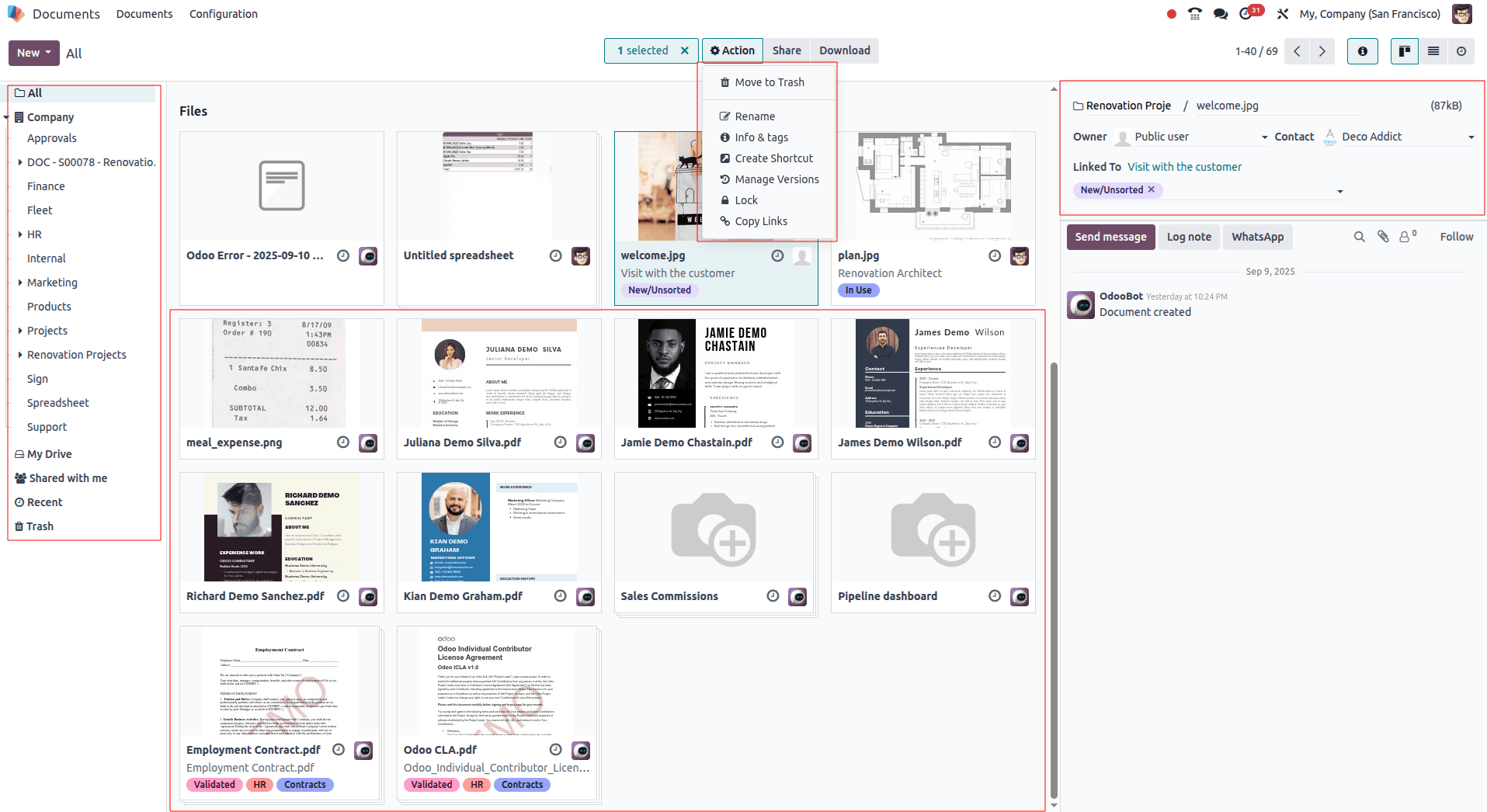
The Odoo 18 Documents interface features a streamlined three-panel layout designed for productivity and clarity. The left sidebar lets users navigate workspaces and access sections like "My Drive," "Shared with me," and "Recent," making it easy to organize and find files. In the center, documents are displayed as cards with previews and color-coded tags, supporting multi-selection and quick identification. The top toolbar provides core actions such as sharing, downloading, sending to finance, and signing, with additional options becoming available when documents are selected, including renaming, duplicating, and managing tags. The right panel offers detailed information on selected documents, including ownership, activity logs, and messaging tools, while advanced search and filtering ensure fast access to any file across multiple workspaces. This efficient layout allows users to locate, manage, and collaborate on documents with minimal effort.
Files Centralization: Smart Document Organization
Files Centralization in Odoo 18 automatically organizes documents based on their business purpose, eliminating manual file sorting. The system intelligently routes documents to appropriate workspaces, ensuring every file finds its proper home without user intervention.
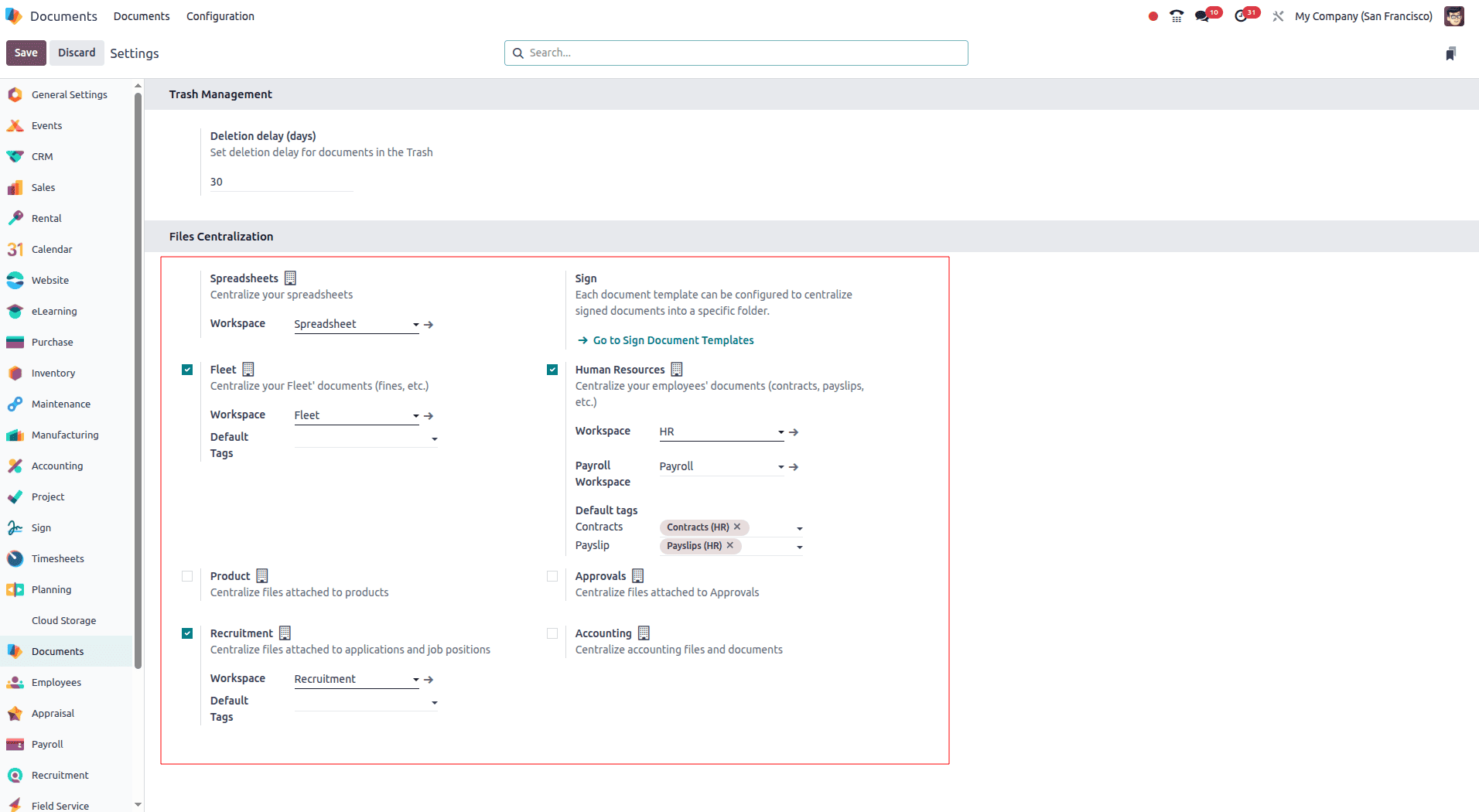
Key Centralization Options
The configuration interface offers centralization options for all major business functions:
Human Resources & Payroll: Automatically separates employee documents into dedicated HR and Payroll workspaces, with pre-configured tags like "Contracts (HR)" and "Payslips (HR)" for instant categorization.
Fleet Management: Routes all vehicle-related documents including registrations and maintenance records to a centralized Fleet workspace with customizable default tags.
Recruitment: Organizes candidate applications and hiring documents into a dedicated Recruitment workspace, streamlining the hiring process documentation.
Spreadsheets & Sign Documents: Directs calculation files to the Spreadsheet workspace while enabling automatic storage of signed documents based on template configurations.
Product, Approvals & Accounting: These modules automatically organize product specifications, approval workflows, and financial documents into their respective workspaces, ensuring compliance and easy access.
Each centralization option can be activated with a simple checkbox and allows you to select target workspaces from dropdown menus, customize default tags, and configure automatic routing rules. This intelligent automation ensures documents are consistently organized according to your business structure while reducing administrative overhead.
Managing Project Documents in Odoo 18
Project document centralization in Odoo 18 creates automatic organization for all project-related files. When enabled, each project gets its own dedicated folder in the Documents module, eliminating manual file sorting and ensuring team members always know where to find project resources.
Automatic Project Folder Creation: The Documents interface shows how project folders are automatically generated - "After-Sales Services," "Office Design," "Research & Development," and various sales order projects all appear as organized folders. The left sidebar mirrors this structure, making navigation between projects effortless.
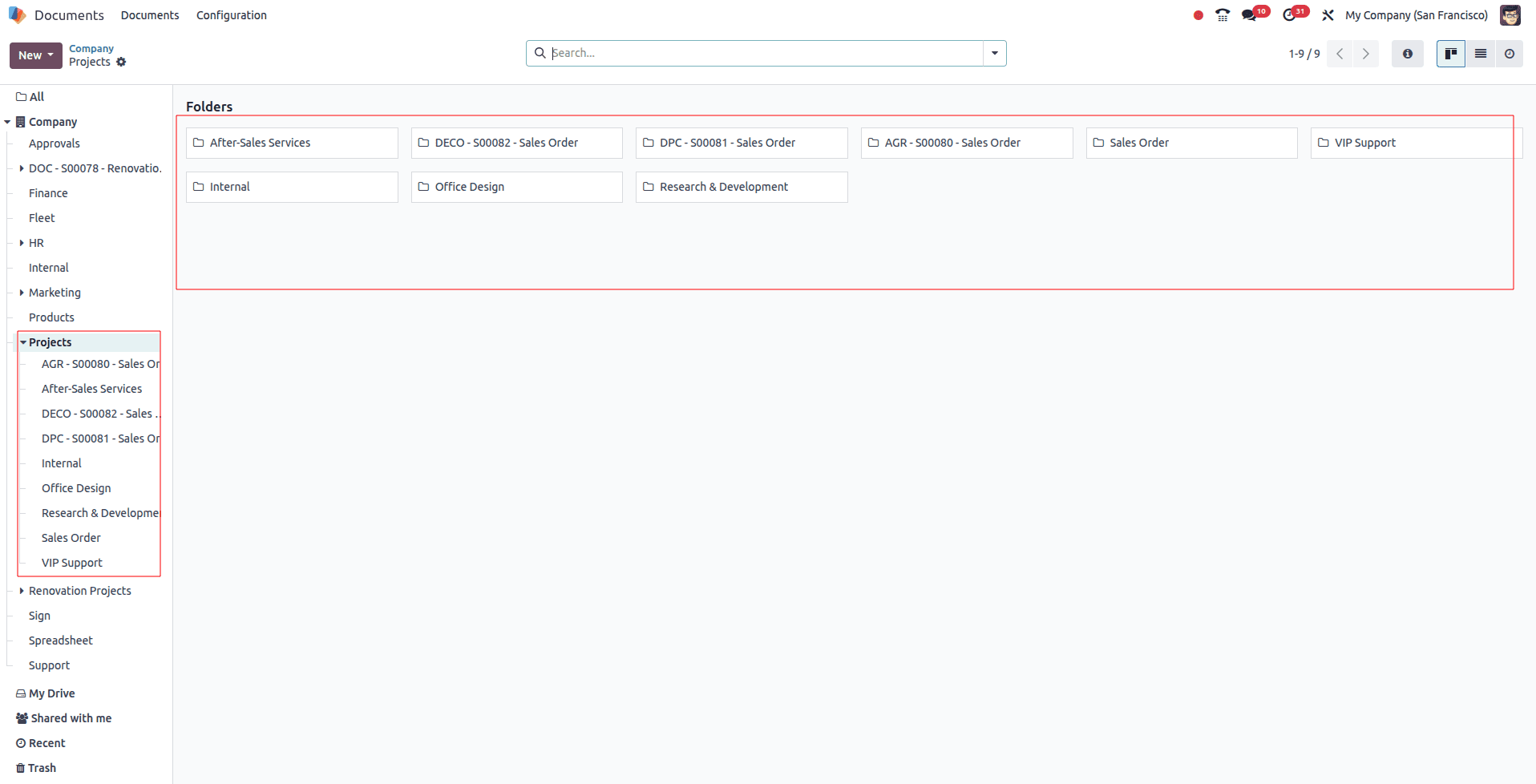
Project Document Configuration: In the project settings, enabling the "Documents" option under "Documents & Analytics" activates this integration. You can specify which folder to use (like "Research & Development") and set default tags for automatic categorization. This simple checkbox creates the connection between your projects and document management system.

Real Project Files in Action: Project workspaces contain typical business documents like meeting notes, technical drawings, and customer correspondence. The "Office Design" workspace demonstrates this with floor plans and customer letters - all automatically organized within the project context.
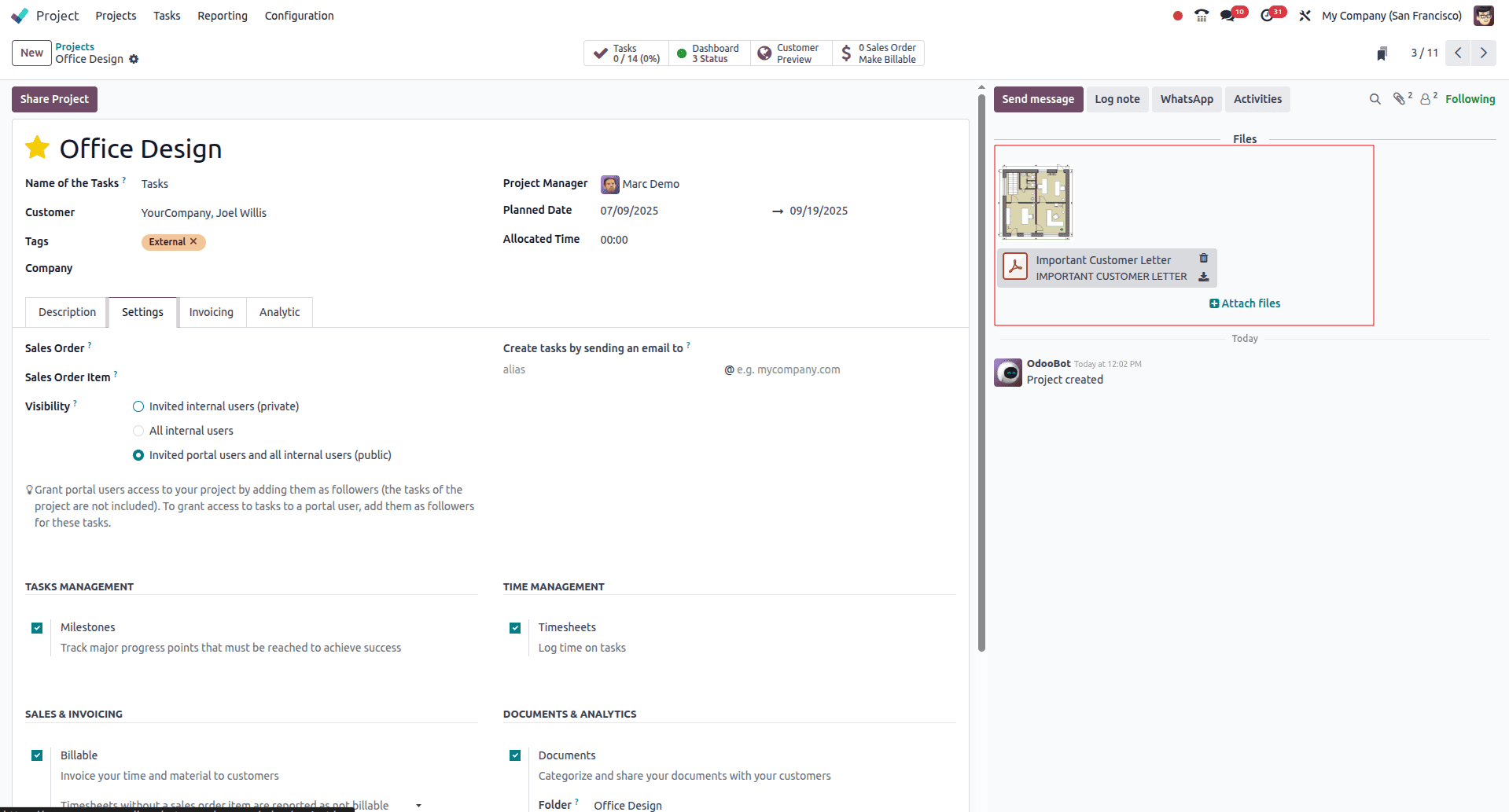
Integrated File Access: Within individual projects, the "Files" section provides direct access to project documents with thumbnail previews and download options. Team members can attach new files directly from the project interface using the "Attach files" button, keeping everything contextually connected.

Managing HR Documents in Odoo 18
Human Resources document management becomes seamless with Odoo 18's centralization features. When HR document centralization is enabled, all employee-related files are automatically organized into dedicated workspaces, creating a structured environment where HR teams can efficiently manage contracts, payroll documents, recruitment files, and employee records.
HR Document Configuration: The Files Centralization section shows the "Human Resources" option enabled with separate workspace designations for general HR documents and payroll materials. The system allows you to specify an "HR" workspace for employee documents like contracts while creating a separate "Payroll" workspace for salary-related documentation with automatic tags like "Contracts (HR)" and "Payslips (HR)."

HR Workspace Structure: The HR workspace displays as organized folders with the main "HR" section expanding to show sub-categories like "Payroll" and "Recruitment." This hierarchical structure mirrors how HR departments naturally organize their work, with payroll documents getting their own space while recruitment materials remain distinct from general employee files.

Payroll Document Organization: When payroll centralization is enabled in Odoo 18, a dedicated "Payroll" folder is automatically created within the HR workspace to organize all salary-related documents. This specialized folder serves as the central repository for payslips, salary structures, tax documents, and other compensation-related files, ensuring that sensitive payroll information remains properly segregated while being easily accessible to authorized HR personnel.

Below, you see that the uploaded payroll document is visible in the document folder.
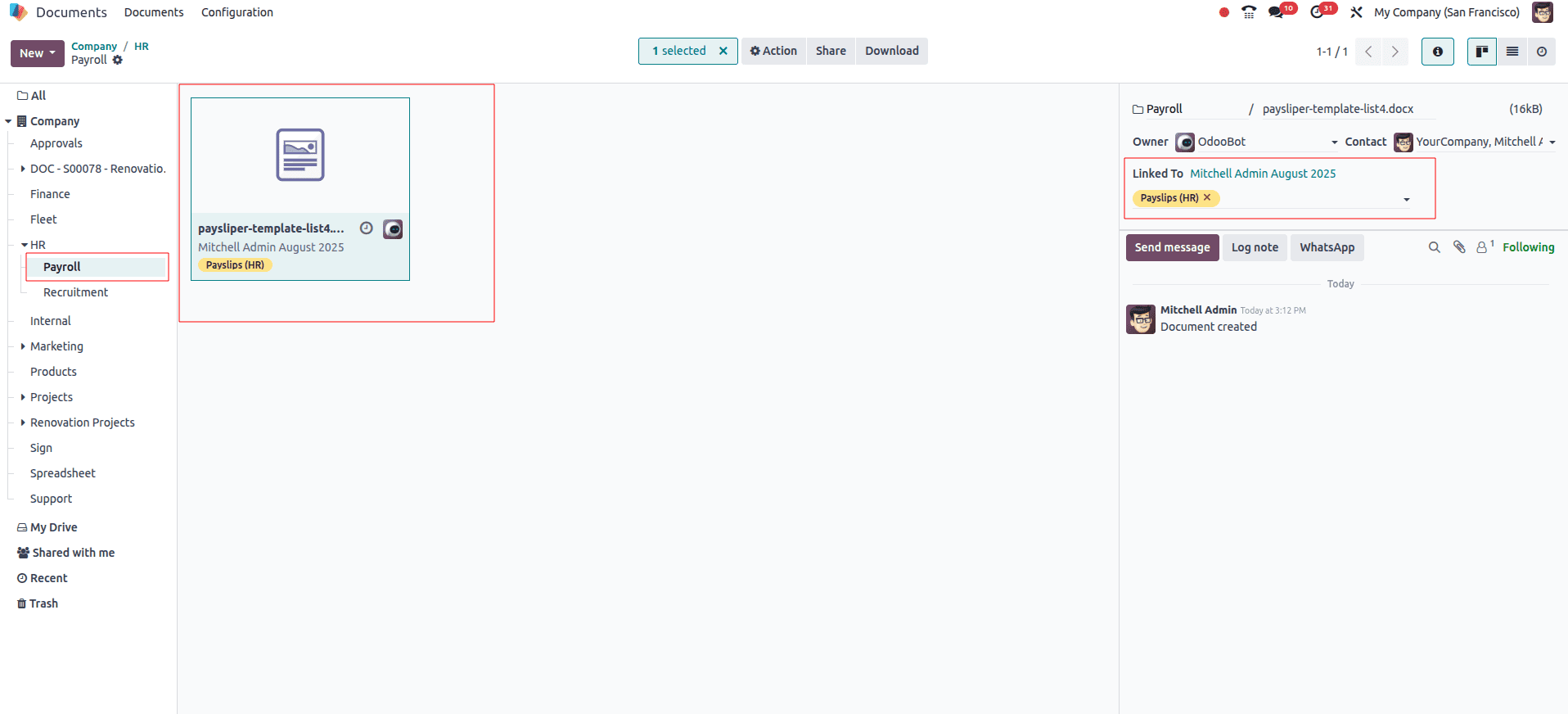
Employee Document Integration: HR document centralization integrates with employee records throughout Odoo, automatically linking contracts to employee profiles and payslips to payroll processing. HR staff can access relevant documents directly from employee records, payroll interfaces, or recruitment workflows without switching between different systems.
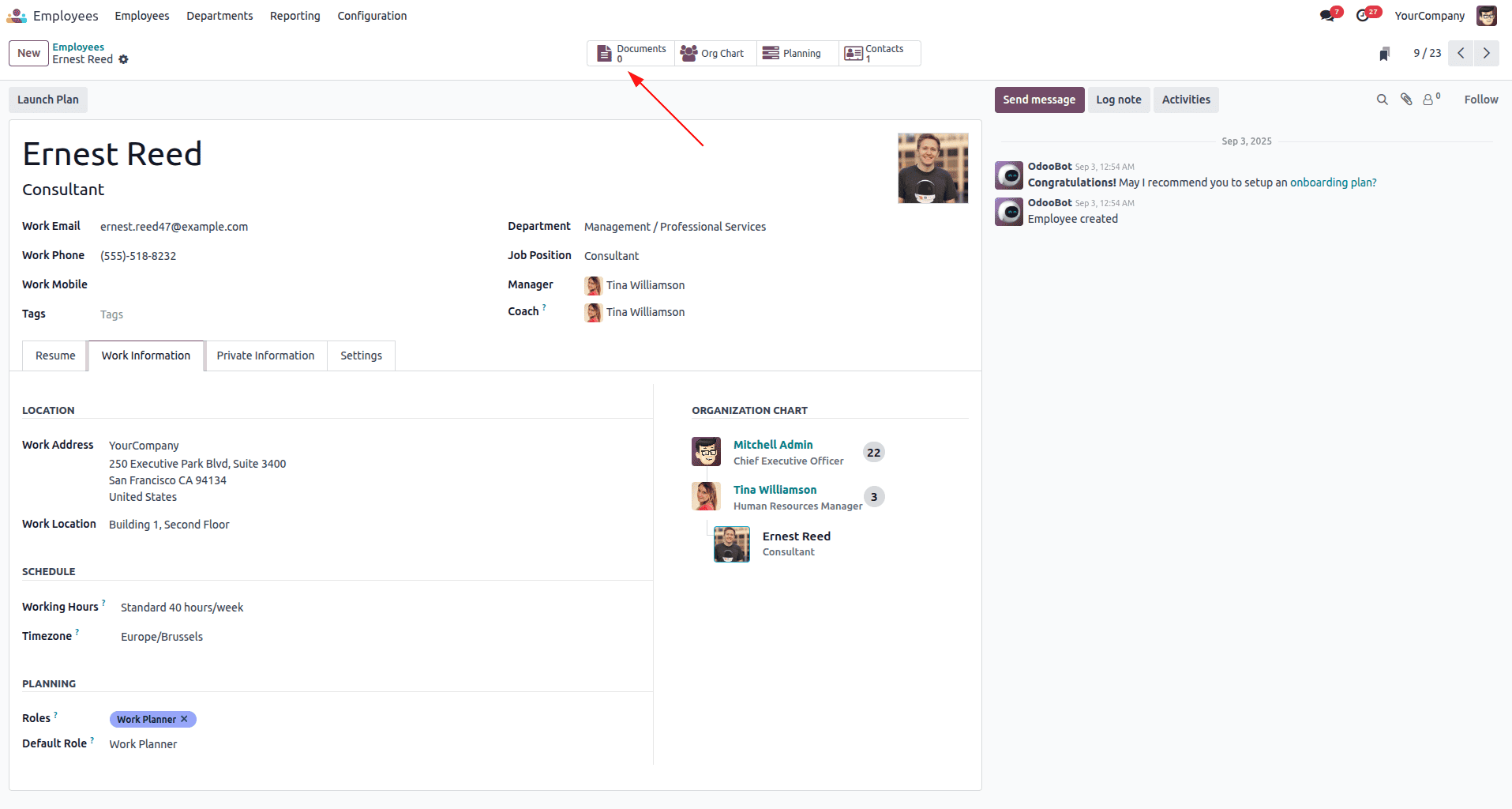
Recruitment Document Management: The recruitment workspace demonstrates automatic organization of hiring-related documents with clear document previews and proper categorization. Each document maintains connection to its related job position and candidate record, creating a complete hiring documentation trail with visual card layouts for efficient candidate document review.
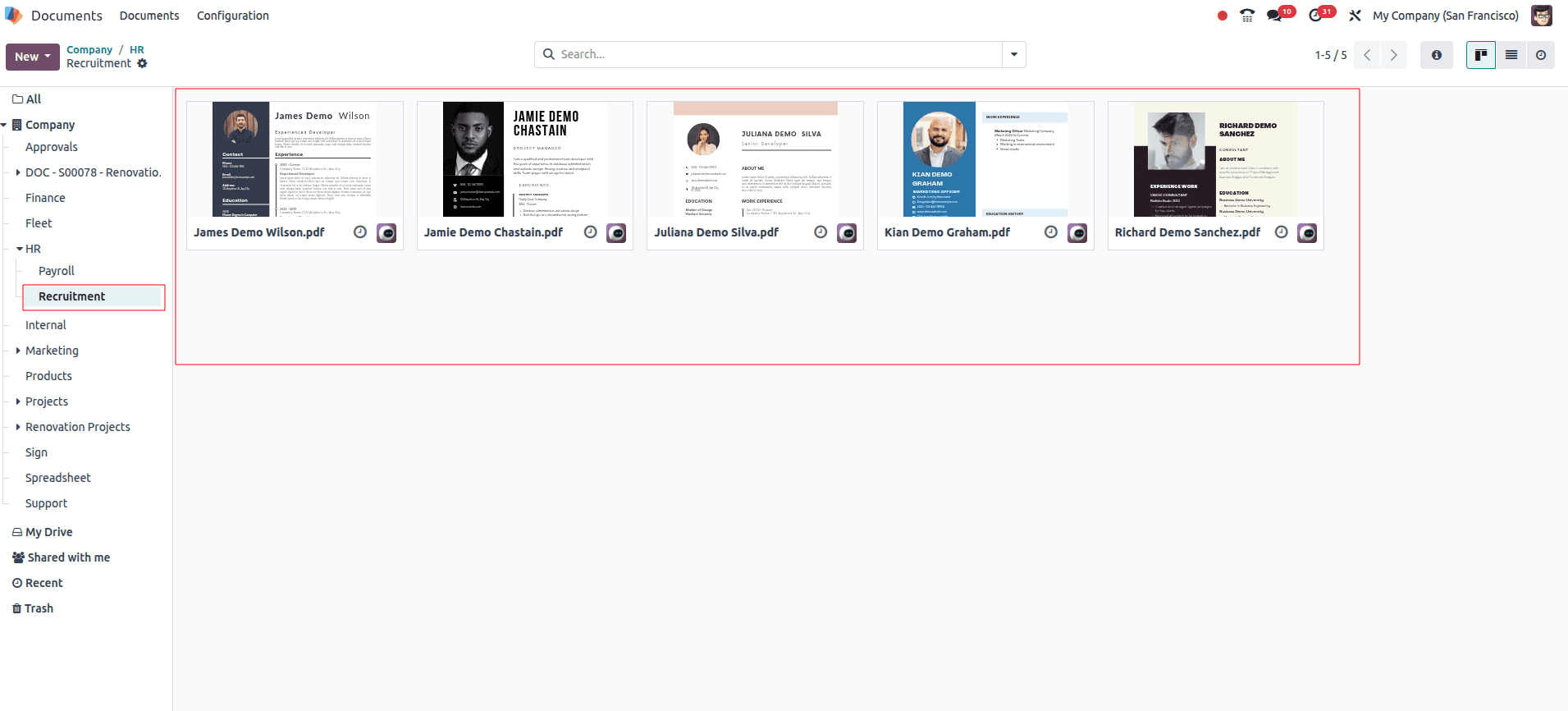
Benefits of HR Document Centralization: Automated organization routes employee documents to appropriate workspaces based on document type, while centralized locations support compliance and audit trail maintenance. HR processes benefit from integrated workflows and workspace-level security settings, ensuring sensitive employee information remains accessible only to authorized personnel while creating more efficient HR operations.
Managing Product Documents in Odoo 18
Product document management in Odoo 18 creates a centralized system for organizing all product-related files, from specifications and images to technical documentation and marketing materials. When product centralization is enabled, every product automatically gets its own document space that integrates seamlessly with the product catalog and sales processes.
Product Document Configuration: The Files Centralization configuration shows the "Product" option enabled to centralize files attached to products within a designated "Products" workspace. The system automatically applies the "Product > New" default tag to newly uploaded product documents, ensuring consistent categorization and easy identification of product-related files across the system.

Product Workspace Organization: Once configured, the Products workspace appears in the Documents interface as a dedicated folder containing all product-related documentation. The left sidebar displays the "Products" section, allowing quick navigation to product files, while the main area shows document cards with visual previews and proper tagging for instant recognition.

Integrated Product File Management: The integration extends directly into product records, where each product displays a "Files" section containing associated documents with thumbnail previews and download options. Team members can attach new files directly from the product interface using the "Attach files" button, maintaining the connection between products and their supporting documentation.

Cross-Module Document Access: Product documents are accessible from multiple touchpoints throughout Odoo, including the Sales module where the "Documents" button shows the count of attached files for each product. This integration ensures that sales teams, inventory managers, and product developers can access relevant documentation directly from their respective workflows without navigating to separate systems.
Benefits of Product Document Centralization: Automatic organization ensures product specifications, images, and technical documents are consistently stored and tagged within their respective product contexts. The centralized approach supports sales processes by providing immediate access to product documentation, while maintaining version control and ensuring that teams always work with the most current product information across all business functions.
Managing Accounting Documents in Odoo 18
Accounting document centralization in Odoo 18 streamlines financial record management by automatically organizing all accounting-related files into a dedicated workspace. When accounting centralization is enabled, invoices, receipts, contracts, and other financial documents are systematically stored within the Finance workspace, creating a comprehensive audit trail that supports compliance and financial reporting requirements.
Accounting Document Configuration: The Files Centralization configuration shows the "Accounting" option enabled to centralize accounting files and documents within a designated "Finance" workspace. This configuration also includes a direct link to "Journals" which connects the document management system to Odoo's accounting journals, ensuring that financial transactions and their supporting documents remain properly linked and organized.
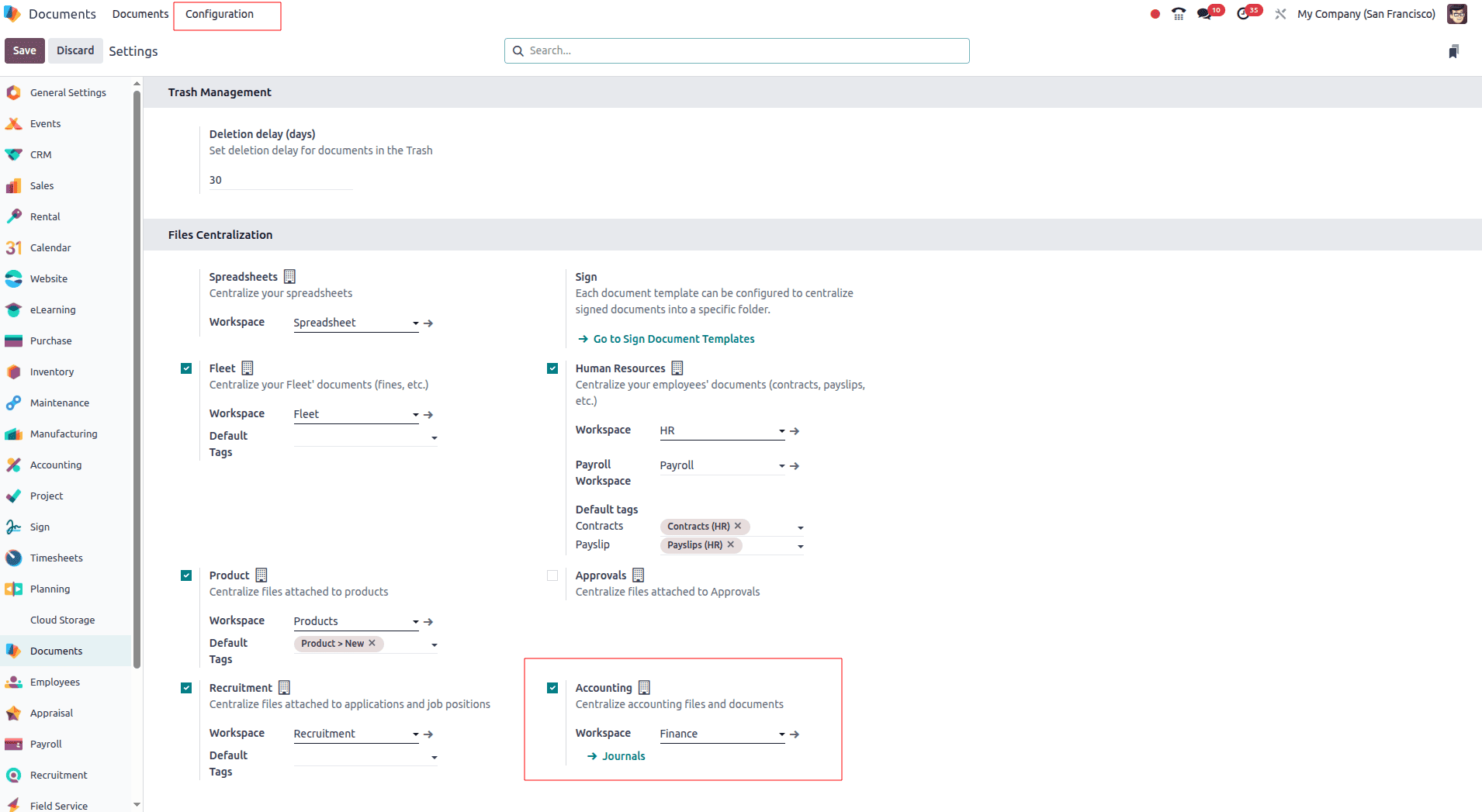
Finance Workspace Organization: Once configured, the Finance workspace displays all accounting documents with proper categorization and status indicators like "Validated," "To Validate," and workflow tags. The workspace contains various financial documents including invoices, agreements, and vendor bills, all organized with clear visual previews and linked to their corresponding accounting records for seamless cross-referencing.
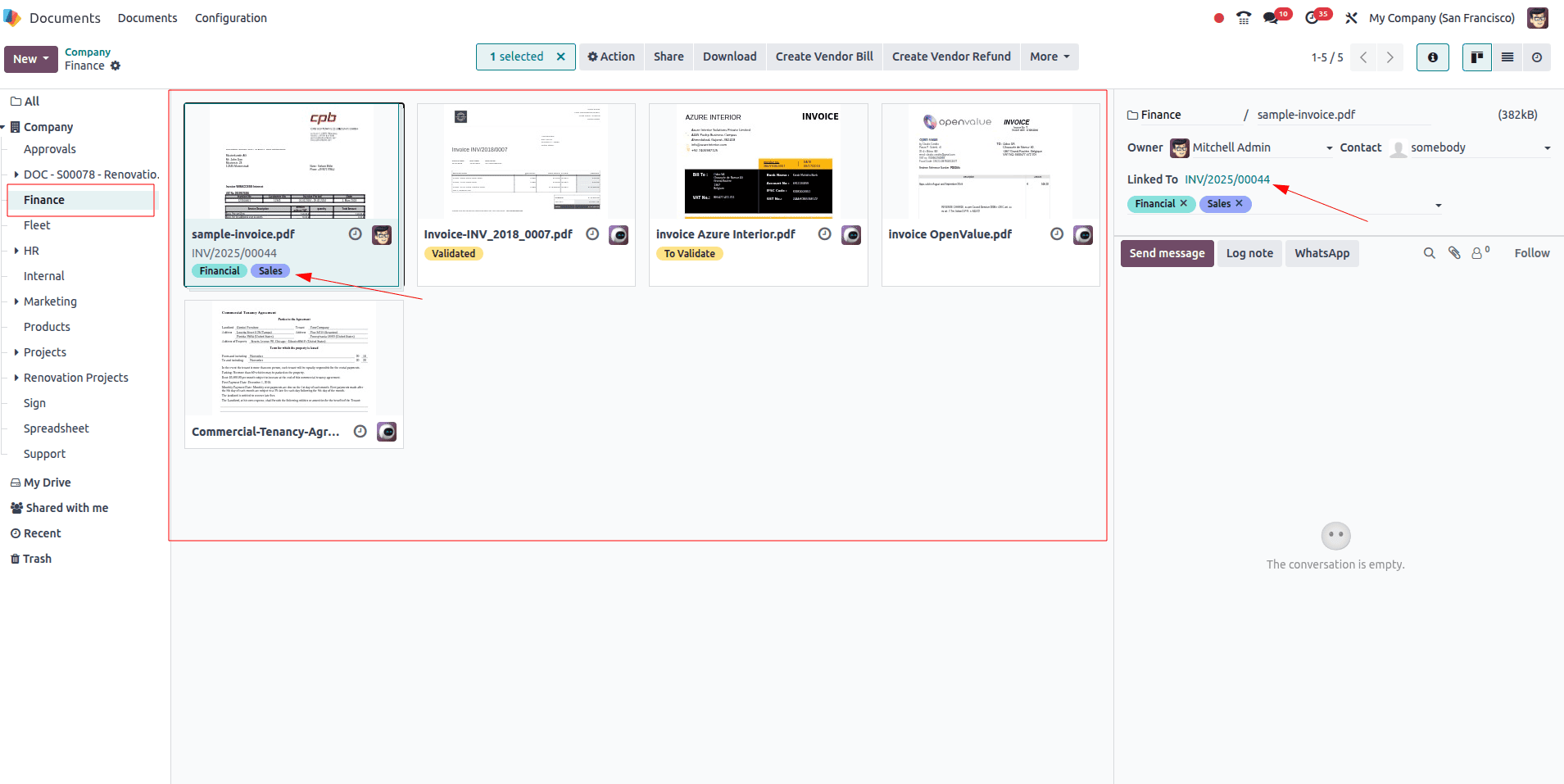
Integrated Invoice Document Management: The integration extends directly into accounting workflows, where invoices display linked document information showing connections to specific accounting records. When viewing invoices in the Accounting module, the "Documents" button provides direct access to related files, while documents show clear linkage to invoice numbers and contain both "Financial" and "Sales" tags for comprehensive categorization.

Journal Synchronization System: The accounting centralization includes journal synchronization functionality, automatically connecting Customer Invoices and other journal entries to the Finance workspace. This system ensures that every financial transaction has its supporting documents properly filed and tagged, creating seamless integration between accounting entries and their corresponding documentation for audit and compliance purposes.

In the documents folder, we can set which journal's associated document is displayed.

Documents pertaining to customer invoices are visible in the finance folder, as you can see in the journal configurations.

The uploaded document is visible in the documents folder.

Benefits of Accounting Document Centralization: Automatic financial document organization ensures all invoices, receipts, and accounting records are consistently stored within the Finance workspace with proper tagging and status indicators. The centralized approach supports financial audits by maintaining clear document trails, while integration with accounting journals ensures that every transaction has accessible supporting documentation, streamlining both daily accounting operations and regulatory compliance requirements.
Managing Spreadsheet Documents in Odoo 18
Spreadsheet document centralization in Odoo 18 creates a powerful integration between business data and document management, allowing users to generate dynamic spreadsheets directly from operational modules. When spreadsheet centralization is enabled, all calculation documents and data exports are automatically organized within the dedicated spreadsheet workspace, providing seamless integration between live business data and document storage.
Spreadsheet Centralization Configuration: The Files Centralization configuration shows the "Spreadsheets" option enabled to centralize spreadsheet files within the designated "Spreadsheet" workspace. This configuration ensures that all dynamically generated spreadsheets from various business modules are automatically stored and organized within the document management system, creating a unified repository for all calculation and analysis documents.

Dynamic Spreadsheet Generation: The sales module demonstrates this integration by allowing users to export selected sales orders directly into spreadsheet format through the "Insert in spreadsheet" action.

Users can choose from templates like "Blank spreadsheet," "Pipeline dashboard," or "Sales Commissions," and configure how many records to include, creating customized data analysis documents that automatically link to the source business records.

Spreadsheet Workspace Organization: The Spreadsheet workspace displays various calculation documents, including sales reports, pipeline dashboards, and commission analyses, each with clear previews and proper categorization.

These documents maintain their connection to the source data while being stored within the document management system, allowing teams to access both static snapshots and dynamic data analysis tools from a centralized location.

Integrated Data Analysis: Spreadsheets created through this system contain live business data and can be accessed through Odoo's built-in spreadsheet viewer, providing full calculation and analysis capabilities. Users can create comprehensive reports, perform data analysis, and generate insights while maintaining the document organization benefits of the centralized system, ensuring that analytical work remains properly filed and accessible to authorized team members.
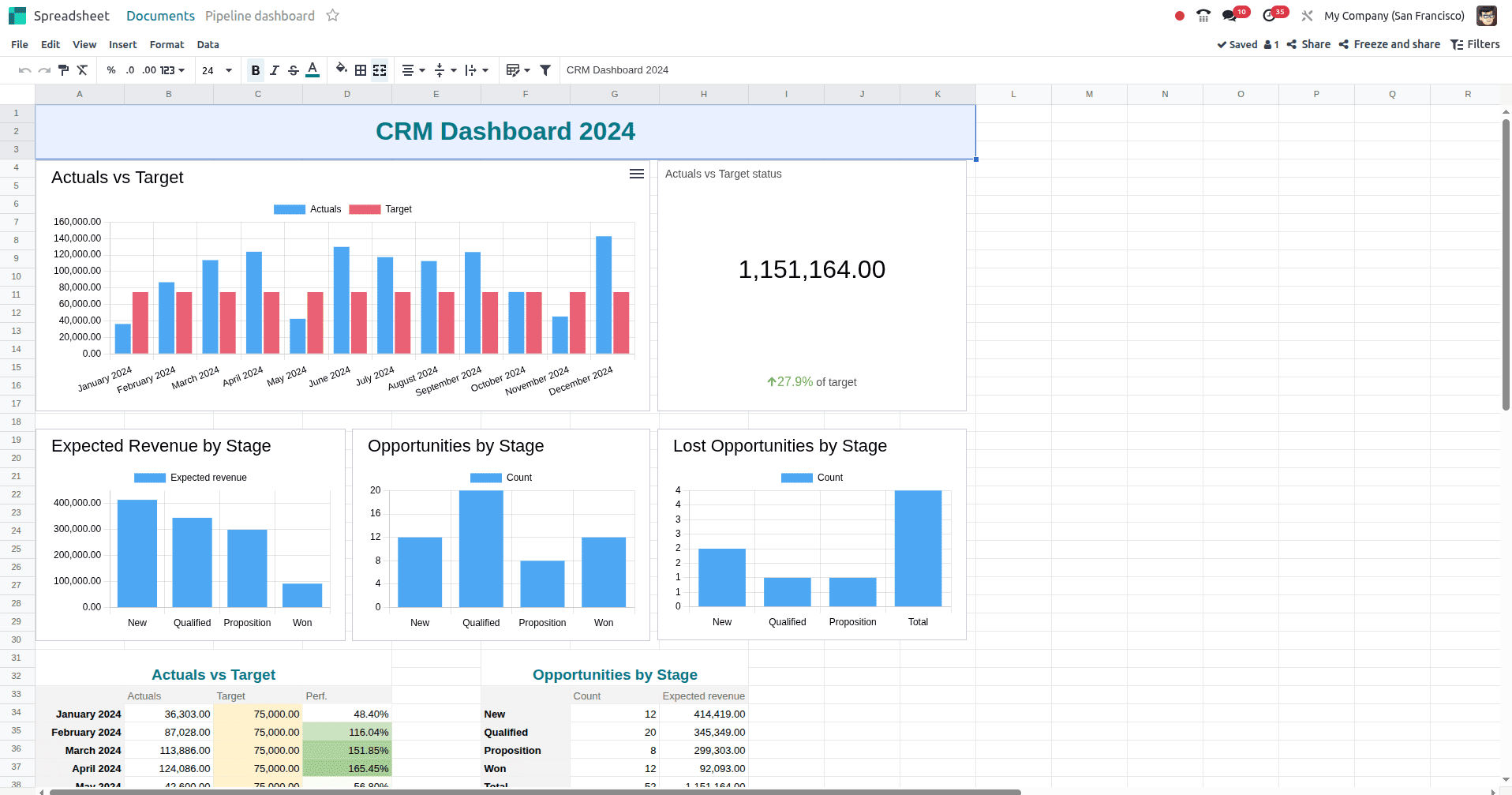
Benefits of Spreadsheet Document Integration: Automatic spreadsheet organization ensures that all data analysis and calculation documents are properly stored within the document management system with clear connections to their source modules. This integration supports business intelligence activities by maintaining organized access to both raw data exports and processed analysis documents, while ensuring that calculation work remains available for future reference and maintains proper version control within the unified document ecosystem.
Odoo 18's Documents module transforms business operations by bringing all your files into one intelligent system that actually understands your workflow. Through workspace centralization, documents automatically find their proper home—whether it's project deliverables, HR records, financial documents, or analytical reports—eliminating the daily frustration of hunting through scattered folders. What sets this system apart is its seamless integration across all business functions: invoices automatically file in Finance, project documents link to tasks, and payroll files maintain proper security separation. This smart organization doesn't just save time; it creates a foundation for better collaboration, improved compliance, and streamlined operations that scale with your business growth. By implementing comprehensive document workspace strategies, organizations finally get a document management system that works for them, transforming what used to be an administrative burden into a seamless part of their business workflow.
To read more about Overview of Documents Module in Odoo 18, refer to our blog Overview of Documents Module in Odoo 18.